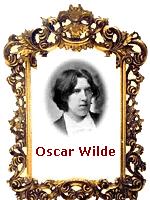
Oscar Wilde – An Occult Connection?
A Biography of Oscar
Wilde Revealing His Ties to the Occult
-DB
 |
Oscar Wilde – An Occult Connection? A Biography of Oscar
Wilde Revealing His Ties to the Occult |
| Oscar Wilde was born in Dublin October 16, 1854. He didn’t quite make it into the 20th Century, perishing in Paris November 30, 1900. (I’m aware that celebrators of the millenium insisted that Y2K, 2000, marked the beginning of the 21st century but they were wrong; it was 2001!) |
|
Oscar’s father William Wilde was a prominent ear and eye surgeon. The father had multiple interests. He was a writer. He owned the skull of Jonathon Swift.He was very upset by the failure of the l848 Irish uprising. Yeats recounted a story where the eye surgeon once took out the eyes of a man, intending to replace them, laid them on a plate and had them accidentally gobbled up by a cat. True or false, who knows? He and his wife, the very dramatic Speranza Wilde, hosted lavish dinner parties at their house at l Merrion Square. Dublin. Before his marriage, Oscar’s father had fathered 3 other children but that was not commonly known; they never got to meet their dazzling half-brother. |
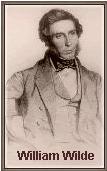 |
 |
Oscar’s mother, Lady Wilde,
changed her first name from Jane to Speranza. There were 3 children: Willie, Oscar and Isolda. The little girl died at age 9.Oscar went to Oxford, Magdalen College. There he had a close friend named Bodley. Bodley kept a journal, so we know that he and Wilde devoted themselves to more flamboyant than studious activities. .Bodley had become a Mason and involved Wilde in that group.Wilde was struck by the gorgeousness of the Masonic outfits. |
|
At this college—and Oscar’s
main interest was Greek studies-. he was very influenced by a professor
named Walter Pater: The following paragraph expresses something about
Pater’s philosophy of life: While all melts under our feet, we may well grasp at any exquisite passion, or any contribution to knowledge that seems by a lifted horizon to set the spirit free for a moment, or any stirring of the senses, strange dyes, strange colours, and curious odours, or work of the artist's hands, or the face of one's friend. Not to discriminate every moment some passionate attitude in those about us, and in the very brilliancy of their gifts some tragic dividing of forces on their ways, is, on this short day of frost and sun, to sleep before evening." In other words, experience, experience the moment! And feel passionately. We’re in the 1870’s now, a time when many people were pouring into the cities from the countryside. Once living in the cities—with city anonymity, and distance from the farmlands, and more people becoming drab wage slaves to the new industrialization, people were losing their old moorings, especially religious moorings. Darwinism was the talking point of the way. |
| This Oxford Don, Walter Pater,
a rather stiff looking character; if not celibate, he looked it - applauded
his era's loss of certitudes and the onrush of metaphysical flux. His fight
was to sever aesthetic experience from any obligations. "Art for art's
sake", and experience for experience's sake, was Pater’s credo. Carpe diem.
Seize the day "To burn always with this hard gem-like flame, to maintain this ecstasy, is success in life." Pater and Wilde were considered aesthetes. But at a certain point, estheticism reached out its hand and met decadence. In this decadence was a SORT of occultism. Decadence, as defined in Victorian times, consisted of: An (anti-Romantic) belief in original sin and in fallen man and nature; omnipresence of evil and the grotesque; lack of health, lack of balance, lack of innocence. |
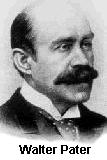 |
| Its imagery consisted of: Sort of a trance or dreamlike state, like reality was not quite reality. * jewels and instances of extreme artifice (the anti-natural), such as (a) masks, (b) Byzantine goldwork, and (c) cosmetics, and (d) the concept of the dandy; |
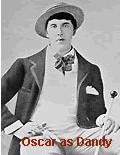 |
* Oscar Wilde was the dandy
extraordinary, tall, commanding, dressed to the hilt, walking down
Piccadilly with a green carnation in his buttonhole, perhaps carrying a
lily. * particularly ornate, perverse, or "unnatural" examples of natural phenomena, such as orchids and peacocks. There was an incomplete and unsuccessful attempt to escape the human condition by means of posing, artifice, and even evil or diabolic, all of which are conceived of as unnatural and therefore better than natural. |
| The Middle Class in England was
bourgeois, rigidly conservative and hypocritical. There was an expression,
"It doesn’t matter what you actually do, just so you don’t do it in the
streets and frighten the horses."Thou shalt be discreet! Don’t ask—don’t
tell! Oscar Wilde detested these values and as the years went on, that is
exactly what he DID do; carried his sexual carryings on to the finest
restaurants and hotels and theatres and anywhere where people of means cared
to look. And you’d better believe, he frightened the horses of smugness and
conventional beliefs and conventional values and people who might say of
themselves "Look here, I’m a respectable person!" And what he did to make
this middle class even more angry: sometimes the young boys he gathered up
were –God forbid! Working-class lads! Many aesthetes at this time were drawn to the Roman Catholic Church,(Oscar’s family though Irish were Anglicans, which was more respectable. But the attraction to the Catholic Church had a certain decadence to it, something almost on the occult track. What attracted these young men to Rome? It wasn’t church canon law! Their attraction was due mostly to the Church's use of beautiful art, sensuous imagery, music; and ritual in its services. Beautiful golden vestments. Chanting. Incense. Genuflecting with a flare. Bleeding crucifixes. Burning candles to statues of saints! (All the good stuff!) It was called "going over to Rome." |
|
|
For the same reasons that they embraced Catholicism, the aesthetes became engrossed in supernaturalism of all sorts: mythology, grotesque imagery, the Devil, the Occult. (I mean, Catholicism of bygone days was a religion where there WAS a devil! You don’t think of devils hanging around low Episcopal churches). Here, the aesthetes found powerful sources of inspiration and imagery in their writings and in their art. By drawing upon Occult imagery in their works, aesthetes achieved both political and creative autonomy by instituting a new language, independent of burdensome, post-Evangelical middle class norms. One example might be the drawings of Aubrey Beardsley. |
| Many writers and scholars
have termed "The Picture of Dorian Gray" an occult novel. The man retains
his youthful look while his portrait, hidden away, grows old, ugly and
hideous, reflecting the increasingly corrupted soul of the subject. The book "The Picture of Dorian Gray" is online: http://www.upword.com/wilde/dorgray.html For anyone who hasn’t read it and wants to. Sometimes it is billed as a horror story, an occult story, or even as gay literature. There is a homoerotic air about it. The novel is an excellent example of this new estheticism that Wilde preached. Here are two excerpts, both from chapter 11: |
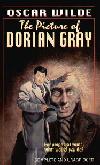 |
| *************** It was rumoured of him once that he was about to join the Roman Catholic communion, and certainly the Roman ritual had always a great attraction for him. The daily sacrifice, more awful really than all the sacrifices of the antique world, stirred him as much by its superb rejection of the evidence of the senses as by the primitive simplicity of its elements and the eternal pathos of the human tragedy that it sought to symbolize. He loved to kneel down on the cold marble pavement and watch the priest, in his stiff flowered dalmatic, slowly and with white hands moving aside the veil of the tabernacle, or raising aloft the jeweled, lantern-shaped monstrance with that pallid wafer that at times, one would feign think, is indeed the "panis caelestis," the bread of angels, or, robed in the garments of the Passion of Christ, breaking the Host into the chalice and smiting his breast for his sins. The fuming censers that the grave boys, in their lace and scarlet, tossed into the air like great gilt flowers had their subtle fascination for him. As he passed out, he used to look with wonder at the black confessionals and long to sit in the dim shadow of one of them and listen to men and women whispering through the worn grating the true story of their lives ========================================= The second excerpt: And so he would now study perfumes and the secrets of their manufacture, distilling heavily scented oils and burning odorous gums from the East. He saw that there was no mood of the mind that had not its counterpart in the sensuous life, and set himself to discover their true relations, wondering what there was in frankincense that made one mystical, and in ambergris that stirred one's passions, and in violets that woke the memory of dead romances, and in musk that troubled the brain, and in champak that stained the imagination; and seeking often to elaborate a real psychology of perfumes, and to estimate the several influences of sweet-smelling roots and scented, pollen-laden flowers; of aromatic balms and of dark and fragrant woods; of spikenard, that sickens; of hovenia, that makes men mad; and of aloes, that are said to be able to expel melancholy from the soul. All this sounds pretty occult to me, albeit occult in a different key. To ponder what is occult (the word means only hidden, esoteric, although I’ve known a few confused souls who are always getting "occult" and " a cult" mixed up. There has been this long-standing tension between the exoteric Church, the one-size-fits-all route to God with the priests doing all the "good stuff", the churches you can find on any corner -- and the esoteric, gnostic, pagan, occult or non-sanctioned paths, those that believe that one can be one’s own priest, and by inner work, meditation, dream study, examination of archetypes, invocation and evocation, come up with the goods on their own. Membership in the Hermetic Order of the Golden Dawn, founded in 1888, included aesthetes such as Algernon Swinburne and prominent Irish poet W.B. Yeats; the great magickians McGregor Matthews, and later the infamous Aleister Crowley --but not Oscar Wilde. Oscar was frying other fish at the time. His wife Constance Wilde was a member. Richard Ellmann, in his carefully researched biography of Wilde, makes no mention of Constance Wilde’s Golden Dawn Membership. There is just a notation that Oscar and Constance pursued their own interests. |
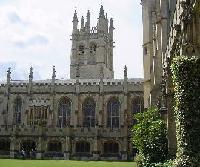 |
But back to the life of
Wilde: More on Oscar at Oxford: Oscar was a huge personality. even as a student. He was known to have elaborate dinner parties, with blue china tea cups and plates. He had internalized enough of Walter Pater’s ballyhooing about direct experience, and letting your emotions burn with this gemlike flame, so that Oscar himself had an experience: syphillis. This was treated with mercury. Shortly after coming up from Oxford, Oscar made a bit of money by going on an extended tour of the U.S. The tour was a success but there was a certain mock humor about the whole thing—showing the semi-barbaric Americans the avant garde of England: |
| After the
American tour, Oscar spent some time in Paris. You know that was trouble!
Wilde was armed with introductory letters and copies of his poems.This was
Jan l883.A young Englishman, Robert Sherard, helped him to settle in Paris,
Thus began a relationship that lasted well after the death of Wilde —with
Sherard writing several biographies later. .Sherard had 3 attributes that
appealed to Wilde: youth, beauty (he was a blond) and idolatry of Oscar. You
know that Oscar had a brilliant wit and repartee. The men took rooms in the
Hotel Voltaire.When Sherard began praising the view, overlooking the Seine,
Wilde retorted: A GENTLEMAN NEVER LOOKS OUT OF THE WINDOW. |
 |
| Wllde wanted to meet French writers and
artists. He met Victor Hugo and started telling anecdotes about the poet
Swinburne: WILDE SAID THAT SWINBURNE POSSESSED A TEMPERMENT SO DELICATE THAT
MERELY TO LOOK AT A GLASS OF WINE WOUD PUT HIM INTO A BACCHANALIAN FRENZY,
SO HE DIDN’T EVEN NEED TO DRINK! Wilde met some of the French decadent writers. One was Rollinat. Wilde noted at 3 o"clock in the morning that he had just reread Rollinat’s poem describing 2 young country people , a boy and a girl, who watch the mating of a cow and bull and silently recognize that that night they will be repeating the same process.Rollinat’s subjects included suicide, disease, live burial, specters, madness, diabolism. Sherard thought that Rollinat needed help, asking Wilde "If you see a man throw himself into the river, wouldn’t you go after him?Wilde replied "I SHOULD CONSIDER IT AN ACT OF GROSS INDECENCY TO DO SO. This aesthetic movement, rather innocent in the US, like "surround yourself with beautiful objects" took on a much darker hue in France: Faustian bargains and – sometimes -- sexual sadism. This aesthetic movement, rather innocent in the US, like "surround yourself with beautiful objects" took on a much darker hue in France: Faustian bargains and – sometimes -- sexual sadism. Wilde returned to England and thought that he had better marry. -He marries Constance Lloyd. For the first couple of years after his marriage, Oscar was the ideal husband, a doting father of two boys. |
| And then it all went South.
Oscar started going out with the young men. At first, they were discreet and
decent young men.Robbie Ross, who remained faithful to Oscar beyond the
Grave and was later his literary executor.There was John Grey, a refined
young man, a poet and bookseller. Meanwhile, Oscar was having some success
writing his plays. There was a chilling fortune telling incident in l893.The guests put their hands through a curtain so that the palmist, named Chiero could read them without knowing who he was reading.When he got to Wilde’s hands, he discovered that the left one and the right one were totally different. |
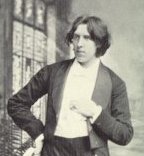 |
| The palmist told him that the left hand denotes hereditary tendencies and the right hand, individual development.Oscar was told that the left hand reflected brilliant development but the right hand , impending ruin. Wilde, who was 38, asked "at what date"? The answer was "Around your 40th year." Oscar left the party. |
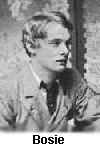 |
John Grey certainly receded in Oscar’s affections once he had crossed paths with Lord Alfred Douglas.who was about 21 and still a student at Oxford. Wilde was in his late 30’s.Lord Alfred, or Bosie as he was called, was blond, beautiful, reckless and unmanageable—and titled. The title likely impressed Wilde, who as an Irishman would always be something of an outsider in circles that mattered. Lord Alfred had a terrible temper. His father, Lord Queensbury was a madman. Bosie’s tastes were extravagant. He and his father were usually feuding, so often Bosie’s allowance was cut off. Oscar was madly in love, and Bosie would manipulate Oscar in order to get back at his father. |
| Fights, pouting, tantrums, pouncing out
of fine restaurants were hallmarks of this relationship. Sometimes Lord
Alfred dashed off to another city in anger. Oscar would follow him, paying
for the hotels. Bosie could never get enough. Every day Wilde was providing
lavish dinners at the best restaurant, giving Bosie gifts.
I get the impression that Wilde seldom had a home cooked meal; none of this "what are we having tonight for dinner Honey? His life was a series of luncheons, teas, private rooms with his party of boys in the best restaurant after the theatres closed. Some of these restaurants were Kettners, the Savoy, and the Cafe Royale. One on occasion, the two men went to a seaside resort where Alfred Douglas came down with flu. Oscar nursed him like a mother hen, waiting on him hand and foot. Lord Douglas got better at the same time Oscar caught whatever he’d had. Douglas, after about a half day at the sick bed, said he’d had enough; he wasn’t having any fun; he actually berated Oscar and headed back to London! |
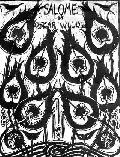 |
A huge falling out occurred
over Oscar’s writing of his play Salome. There was much
decadence in this play, with Salome clamoring for the head of John the
Baptist and
the whole play having a stylized, repetitious, hypnotic effect, chanting—and
enchanting. Since Bosie had no real authorship except in college
publications—the
Spirit Lamp—Oscar commissioned his lover to translate the play from the
French. It turned out that Lord Alfred’s French was not up to the task; Oscar criticized the translation. This led to a huge blow up. Meanwhile, there was Constance Wilde, who seldom saw her husband. Once she went looking for him; I think she needed money. She found him in a hotel room with Lord Alfred Douglas. |
| A blackmailer came to the
door at l6 Tite St. in the Chelsea section of London (off
the Kings Rd) one day, trying to get money for a love letter he had in his
hands, a
letter Oscar had written to his dear boy. Lord Alfred, ever cautious as
usual,
jammed the letter into his pocket and took the jacket to the cleaners.
Something
like this coming down could have spelled bad because in 1885 Parliament had
passed a
sodomy law, making consenting sex between two grown men a criminal act. Now—onto the trials of Oscar Wilde. There were 3 trials. One night at the Albemarle Club, a porter passed a card to Wilde from Lord Alfred’s father, Queensbury, saying "to Oscar Wilde, posing as a somdomite." The misspelling was to protect Queensbury. But Wilde took the bait, and immediately sued Queensbury, setting up a trial in the Old Bailey. Frank Harris, a savvy journalist and friend of Wilde’s, tried hard to talk Wilde out of pursuing the suit. |
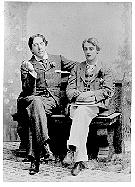 |
| Harris was familiar with Wilde’s sexual
exploits as well as was the average person in the "small village’ of
London, England.He knew Wilde would get chewed up and spit out, in court.
Just when Harris thought he had talked Wilde out of proceeding with this hand grenade lawsuit, Lord Alfred walked in and said no no no, Oscar, you can’t let my father get away with this, you’ve got to sue him! And of course Wilde listened to Lord Alfred. The first trial, the libel suit—Wilde was in very high spirits. He lied at the first question put to him, giving his age as 39. But Prosecutor Carson who had attended university with Wilde, jumped on this and made him admit that he was over 40. Wilde was prepared to defend his writings, especially Dorian Gray, as literary works, but Queensbury, Lord Alfred’s father, presented a list of l5 occasions on which Wilde had solicited more than l2 boys to commit sodomy.(Lord Alfred Douglas was NOT at this trial. He was ordered to stay far away by everyone. So as was typical of those times, the big fish with the title of Lord got off scott free while the lesser young men got jacked up.) Here is an example of the kind of cross-examination that occurred: Carson: the affection and love of the artist of Dorian Gray might lead an ordinary individual to believe that it might have a certain tendency? Wilde: I have no knowledge of the views of ordinary individuals. Carson: Have you ever adored a young man madly? Wilde: No, not madly. I prefer love. That is the higher form. Carson: Never mind about that, let us keep down to the level we are at now. Wilde: I have never given adoration to anyone except myself. Carson: I suppose you think that is a very smart thing. Wilde: No, not at all. Then later, talking about a servant named Grainger at a house where Lord Douglas had rooms: Carson: Did you ever kiss him? Wilde: Oh dear no, he was a peculiarly plain boy. He was unfortunately extremely ugly. Carson: Was that the reason you did not kiss him? Wilde: Oh Mr. Carson, you are extremely insolent. Carson: Why, sir, did you mention that this boy was extremely ugly? Wilde: For this reason. If I were asked why I did not kiss a doormat,I should say because I do not like to kiss dormats. Suffice to say that at this first trial, where Wilde actually sued for libel against Queensbury, so much unsavory testimony came out that prosecutors immediately sought to have Oscar arrested. This time Oscar would be the person standing in the dock. Wilde’s plays that were running in the West End, "An Ideal Husband" and "The Importance of Being Ernest" were closed, Oscar’s name pulled down from the signs. Friends were dropping like flies. In the 2nd trial, Oscar was joined in the dock by two of the men he had been accused of consorting with, Alfred Taylor and Parker. Again, Oscar’s friends urged him to escape to Paris. His brother, Willie, an alcoholic, proclaimed "at least my vices are moral." Willie and Oscar’s mother Speranza , entreated him as an "Irish gentleman" to face the music. Oscar’s mother: If you stay and go to prison, you will always be my son but if you run away I will disown you. Meanwhile, the night boat over to Ireland or the boats to France were crammed with beautiful, dandyish aesthetes. Maybe they had encountered Wilde. Or maybe they shared his proclivities. But they had the sense to "get out of Dodge." A friend Frank Harris asked to borrow a yacht to get Oscar out. Wilde refused to go. Oscar and Constance had to move out from Tite Street quickly. Robbie Ross got in and saved a lot of Oscar’s literary papers. He tried to find a hotel but Queensbury’s detectives were tracking him around London, and tipped off the hotels where Oscar had taken refuge. At long last, he and Constance had to bunk up with Willie Wilde, the alcoholic journalist brother who never understood Oscar. At the trial, Alfred Taylor refused to betray Oscar in any way. There was testimony from Taylor’s landlady and fellow tenants about his oddly curtained and perfumed rooms, and the young men who came there to tea. Taylor maintained a double wardrobe—men’s and women’s clothes. Again, Lord Alfred Douglas was kept away from the trial. He himself had wanted to testify but it would have been a calamity. This second trial ended in a mistrial so Oscar was immediately retried. Constance Wilde went to see her husband, bringing an urgent message from his lawyer that Oscar really did need to try to escape. |
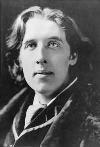 |
|
| There was the testimony of some of the
young men who had been involved with Wilde, the testimony of the chambermaid
at the Savoy about fecal stains on the hotel sheets where Wilde and Lord
Alfred Douglas had slept (Douglas was never called in to deny it!) ; the
last day of the trial, May 25, was the Queen’s birthday, so much patriotic
fervor. The judge in this last trial, Mr. Justice Wills, declared "This is
the worst case I have ever tried" and sent the jury out with instructions on
the importance of maintaining the "highest moral tone." Wilde must have
given up the fight because even while he was standing in the dock, his mind
had already begun composing the "Ballad of the Reading Gaol." In the sentencing, the judge put forth much rhetoric: The crime of which you have been convicted is so bad that one has to put stern restraint upon one’s self to prevent oneself from describing, in language which I would rather not use, the sentiments which rise to the breast of every man of honour who has heard the details of these terrible trials....people who can do these things must be dead to all sense of shame. The sentence was two years of hard labour. Oscar did the time. He was never to see his two sons again; they were sent away and their last names changed. Both his mother and his brother died while he was in prison. Shortly after his release, his wife Constance died. There was no question of his living in the British Isles again. He finished his life in Paris – 2 l/2 more years, going by a new name: Sebastian Melmoth. Sometimes his friends came over to spend time with him. He was broke. Down and out. He drowned his sorrows in absinthe. His health wasn’t good. He had fallen on his ear while in jail, and the wound never quite healed- perhaps because the syphilis had never really gone away. The doctors noted several cerebral disturbances owing to the old ear injury, and concluded that Oscar had encephalitic meningitis. |
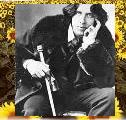 |
Robert Ross and Reggie Turner were 2 friends who stayed with Oscar to the death. Ross was a devout Catholic and wondered if he should call a priest. Oscar had once said that Catholicism was the only religion to die in. Oscar also said that Catholicism is the only religion for a real saint or a real sinner (he included himself in the latter category) whereas Anglicanism was perfectly good enough for "respectable people."But Ross knew Oscar’s sentiments were not Catholic; He had told a friend that Christ was not divine, as this would place too broad a gulf between Christ and the human soul.He told someone else that he hoped we would have "tremendous passions" in the next world. |
| This is hardly the kind of Catholicism
that would be acceptable to—say—Pope Benedict XVI. Ross fervently declared
that Catholicism was true, but Wilde kindly said "No, Robbie, it isn’t
true."As Oscar slipped in and out of consciousness, he did agree to see a
Catholic priest, took the sacrament and presumably made peace and died in
the cradle of the church. DB Ref. Richard Ellmann, "Oscar Wilde" Wilde-"The Picture of Dorian Gray" Sherard, "The Real O.W." Harris "Oscar Wilde: Three Times Tried" Hyde, ed. "Trials of Oscar Wilde" |